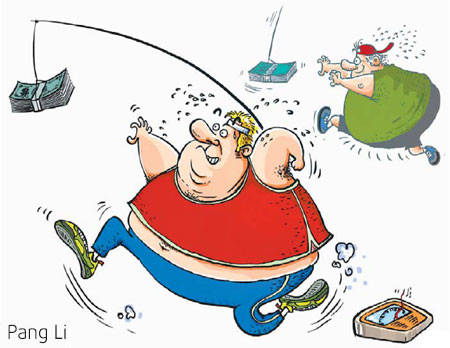 Health authorities and corporations are increasingly offering money to people who quit smoking, lose weight or take medicine, despite uncertainty that these incentives will work beyond a few months, say doctors.
Health authorities and corporations are increasingly offering money to people who quit smoking, lose weight or take medicine, despite uncertainty that these incentives will work beyond a few months, say doctors.
In a paper published online by the British Medical Journal, they said the trend also posed an ethical dilemma, as physicians were being urged to dangle gifts in exchange for a healthier lifestyle.
Health psychologist Theresa Marteau of King's College, London and colleagues reviewed the outcome of a range of "incentive" schemes.
Such programs include a project in the suburban London county of Essex, in which pregnant women were offered food vouchers worth 20 pounds ($28) if they stopped smoking for a week; 40 pounds if they kept off cigarettes for four weeks, and another 40 pounds after a year.
In Varallo, Italy, the authorities offered the equivalent of $67 to overweight residents if they achieved a target weight, rising to $268 if they sustained the goal for five months and $670 for 12 months.
In Tanzania, men and women aged 15-30 were offered the equivalent of $45 if they regularly tested negative for a sexually transmitted disease.
In East London, psychotic patients were offered between 5 and 15 pounds ($7-21) for getting an injection of anti-psychotic drugs.
Looking at the published evidence, the paper said incentives in smoking cessation programs generally failed after six months or beyond a year or so in weight-loss experiments.
Incentives that stood a better chance of working were those in weight-loss programs that offered a big financial carrot - a bonus of more than 1.2 percent of an individual's income - and those targeted at low-income people who needed a vaccine for a disease or treatment for TB.
Many doctors, it said, also worried about the moral context of incentives: whether these amounted to bribes, an act of paternalism or a breach of trust between healthcare provider and patient.
The paper argued that some incentive schemes could be a useful way of promoting better health and reducing costs, and urged the medical community to reflect on which ones could work and were acceptable.
"Ultimately, if personal financial incentives prove to be effective and acceptable in only a few contexts, they may still offer an important means by which to improve population health," it says.
(Agencies via China Daily April 15, 2009)